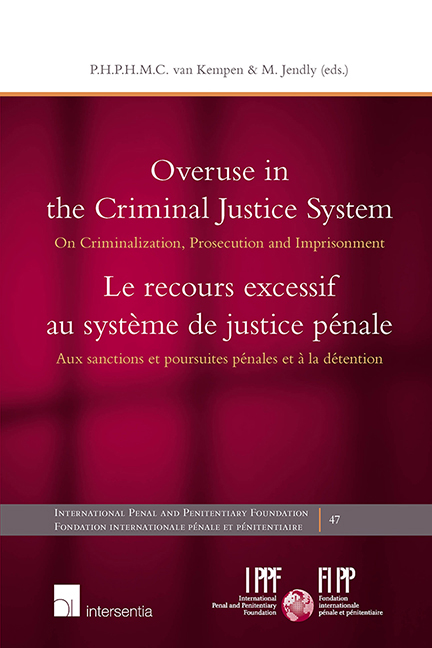Book contents
- Frontmatter
- Dedication
- Contents
- Acknowledgements
- Remerciements
- PART I INTRODUCTORY SYNTHESIS AND ANALYSES 1ÈRE PARTIE. SYNTHÈSE ET ANALYSES INTRODUCTIVES
- PART II THEMES 2ÈME PARTIE. THÈMES
- PART III NATIONAL REPORTS 3ÈME PARTIE. RAPPORTS NATIONAUX
- Overuse in the Criminal Justice System in Argentina
- Le recours au système de justice pénale en Belgique: état des lieux et perspectives
- Overuse of Criminal Law in Finland
- Overuse in the Criminal Justice System in Germany
- Overuse in the Criminal Justice System in Greece
- Overusing the Criminal Justice System: the Case of Ireland
- Overuse in the Criminal Justice System in Japan
- Tendencies of Overuse in Criminal Law Policy and Criminal Law Enforcement in the Netherlands
- Overuse in the Criminal Justice System in New Zealand
- Overuse in the Criminal Justice System in Nigeria
- Overuse in the Criminal Justice System in Poland
- Overuse in the Russian Criminal Justice System
- Overuse in the Criminal Justice System in Spain
- Recourt-on de manière excessive au système pénal en Suisse?
- Overuse of the Criminal Justice System in Taiwan
- Overuse and Underuse of the United States Criminal Justice System in the Area of Business Crimes
- The International Penal and Penitentiary Foundation: history and purpose
- La Fondation internationale pénale et pénitentiaire: histoire et objectif
- The IPPF Series
Tendencies of Overuse in Criminal Law Policy and Criminal Law Enforcement in the Netherlands
from PART III - NATIONAL REPORTS 3ÈME PARTIE. RAPPORTS NATIONAUX
Published online by Cambridge University Press: 26 June 2019
- Frontmatter
- Dedication
- Contents
- Acknowledgements
- Remerciements
- PART I INTRODUCTORY SYNTHESIS AND ANALYSES 1ÈRE PARTIE. SYNTHÈSE ET ANALYSES INTRODUCTIVES
- PART II THEMES 2ÈME PARTIE. THÈMES
- PART III NATIONAL REPORTS 3ÈME PARTIE. RAPPORTS NATIONAUX
- Overuse in the Criminal Justice System in Argentina
- Le recours au système de justice pénale en Belgique: état des lieux et perspectives
- Overuse of Criminal Law in Finland
- Overuse in the Criminal Justice System in Germany
- Overuse in the Criminal Justice System in Greece
- Overusing the Criminal Justice System: the Case of Ireland
- Overuse in the Criminal Justice System in Japan
- Tendencies of Overuse in Criminal Law Policy and Criminal Law Enforcement in the Netherlands
- Overuse in the Criminal Justice System in New Zealand
- Overuse in the Criminal Justice System in Nigeria
- Overuse in the Criminal Justice System in Poland
- Overuse in the Russian Criminal Justice System
- Overuse in the Criminal Justice System in Spain
- Recourt-on de manière excessive au système pénal en Suisse?
- Overuse of the Criminal Justice System in Taiwan
- Overuse and Underuse of the United States Criminal Justice System in the Area of Business Crimes
- The International Penal and Penitentiary Foundation: history and purpose
- La Fondation internationale pénale et pénitentiaire: histoire et objectif
- The IPPF Series
Summary
INTRODUCTION: TENDENCY TO A ‘TOUGH IN CRIME’ POLICY WITH SOME EXCEPTIONS
In order to shed light on aspects of the use and overuse in the criminal law system, policy and law enforcement in the Netherlands, one can see several more or less dualistic developments. The major trend is clear: there is a strong call to emphasize the possibilities for criminal liability, criminal prosecution and sanctioning. The general approach is highly politically driven; politicians want to be ‘tough on crime’. For instance, as a reaction to terrorism, this tendency might be understood as being driven by developments in society. The call for a certain change in substantive criminal law and in the possibilities for investigating computer crimes is louder nowadays as well. This accentuated use of criminal law does not necessarily need to be characterized as ‘overuse’. Other aspects and changes tend more towards this qualification, especially where changes in criminal law politics are driven by other factors than what is necessary within a rational-pragmatic, evidence-based approach and policy.
This focus has dominated changes in legislation and criminal law politics in the Netherlands over the last decades in a way that has been characterized as a development towards a ‘totaal strafrecht’; a firm and omnipresent criminal law enforcement that at any time and in any situation guarantees the effective application of severe and strict criminal law sanctions, including possibilities for further effective control of behaviour of the criminal after the execution of sanctions. Although this tendency is not typical for the Netherlands alone, the impression is that there is more focus on this policy in the Netherlands than in other European countries. The call for a ‘tough on crime’-policy is not evidencebased on higher crime rates in the Netherlands. On the contrary, crime rates are falling and people, if questioned in detail, even feel more safe in the Dutch society. But these (‘alternative’?) facts hardly seem to ‘confuse’ the mind of policymakers who are convinced that criminal law enforcement should be more firm and strict to do justice to the ‘legitimate rights and interests of victims of crime’ and to ensure that the Dutch society as a whole will be more ‘safe’.
- Type
- Chapter
- Information
- Overuse in the Criminal Justice SystemOn Criminalization, Prosecution and Imprisonment, pp. 431 - 448Publisher: IntersentiaPrint publication year: 2019

